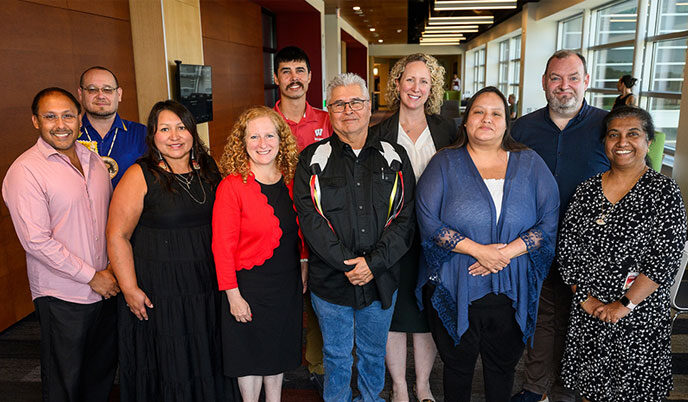
AI screening tool helps refer patients for opioid use disorder treatment
An artificial intelligence-driven screening tool developed by a research team at the University of Wisconsin School of Medicine and Public Health successfully identified hospitalized adults at risk for opioid use disorder and recommended referral to inpatient addiction specialists.

A path for safer opioid prescribing
An approach to prescribing opioids that pairs clinician education with patient-centered monitoring and feedback could help primary care doctors minimize prescribing opioid medications to manage patients’ chronic pain, according to a University of Wisconsin–Madison research team.

Trust is key to collaborating with Native community
From their home near the forested lakes of Mole Lake, Wisconsin, the Tribal Council of the Sokaogon Chippewa Community (SCC) traveled to the University of Wisconsin–Madison, where they were welcomed by health sciences and biomedical researchers and staff.

Hasmeena Kathuria to lead UW Center for Tobacco Research and Intervention
Dr. Hasmeena Kathuria will become the next director of the Center for Tobacco Research and Intervention at the University of Wisconsin School of Medicine and Public Health.

New study: Longer is better when treating opioid addiction with medication
A large study of Medicaid patients found that the longer they take medication to treat their opioid use disorder, the less likely they are to overdose.

UW–Madison establishes state’s first and only addiction hotline for providers
In what is believed to be a national first, the University of Wisconsin–Madison, in conjunction with UW Health, has established a new resource for Wisconsin primary care physicians and other providers to help them successfully manage patients with addictions.

Mobile app helps patients struggling with addiction in primary care settings
University of Wisconsin School of Medicine and Public Health researchers have conducted one of the most comprehensive implementation studies examining the use of mobile health technology in the United States’ health care system.

Investigators are tracking America’s deadliest killer: Tobacco addiction
Mike Eheler didn’t want to die and leave his wife and four kids without him. Like most smokers, he became addicted as a kid. He had smoked for 23 years, his grandmother had died from lung cancer, and now he could feel the toll on his health — and on his ability to support his family in the way he’d dreamed. It was slipping away, one $7 pack of carcinogens at a time.